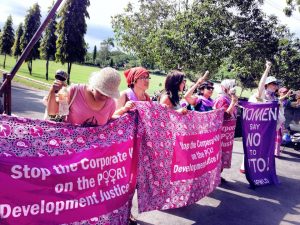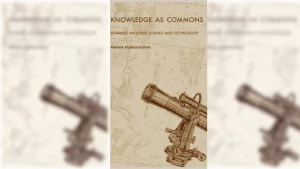 Dear Members of the World Trade Organization (WTO), We are writing as 300 member organizations of global civil society from more than 150 countries, representing tens of millions of people from around the world, regarding the ongoing negotiations on the WTO towards the 11th Ministerial meeting (MC11) in Buenos Aires, December 10-13, 2017.
Dear Members of the World Trade Organization (WTO), We are writing as 300 member organizations of global civil society from more than 150 countries, representing tens of millions of people from around the world, regarding the ongoing negotiations on the WTO towards the 11th Ministerial meeting (MC11) in Buenos Aires, December 10-13, 2017.
We are increasingly concerned about press reports indicating that some WTO members are pushing a dangerous and
inappropriate new agenda under the disguising rubric of “e-commerce,” even though there was no consensus to
introduce this new issue during or since the Nairobi Ministerial. In addition, we are deeply disturbed by reports that
the urgent need to change existing WTO rules which are constraining governments’ policy space for job creation and
development, including achievement of the Sustainable Development Goals (SDGs), is becoming further blocked in
the lead-up to the 11th Ministerial.
Citizens around the world have given clear messages to governments that the current rules of the global economy,
including global trade rules, have exacerbated inequality and left far too many impoverished. Thus, we urge WTO
members to reflect on this dynamic and to take decisions that will allow the global trading system to contribute to,
rather than constrain, shared prosperity and development.
Below we outline our concerns regarding the following issues that are being, or should be, discussed in WTO:
- Proposals regarding e-commerce and their impact on national laws and regulations
- Proposals to limit the scope and effects of public interest regulation
- Fish subsidy disciplines that discourage overfishing by rich countries but still allow poor countries to grow
- The time has come to fix bad existing WTO rules, not to expand them;
- Agricultural rules must prioritize food security and food sovereignty
- There is a need for more flexibility for development policies.
Wrong Agenda: E-commerce
A number of new e-commerce proposals have been made at the WTO in the last year. Proponents often disguise
their proposals under the rubric of e-commerce as being necessary to unleash development through the power of
small- and medium-sized enterprises (SMEs). But SMEs are the least likely to be able to compete with giant
transnational corporations, which enjoy the benefits of scale, historic subsidies, technological advances, strong statesponsored infrastructure, tax avoidance strategies, and a system of trade rules written for them and by their
lawyers.
Key provisions of the proposals include prohibiting requirements to hold data locally; to have a local presence in the
country; no border taxes on digital products; prohibitions on regulating cross-border data transfers; and even
prohibitions on requiring open source software in government procurement contracts. There is no economic
rationale as to why digitally traded goods should not have to contribute to the national tax base, while traditionally
traded goods usually do. Data is now the most valuable resource; furthermore, privacy and data protection are
fundamental human rights and they cannot be abandoned in the interests of trade. Locking in rules in the WTO to
allow corporations to transfer data around the world without restrictions would forever deny the right of countries
and citizens to benefit from their own data and intelligence in the future, and it would restrict the ability of countries
to implement appropriate data privacy and consumer protection measures. What e-commerce proposal proponents
call “localization barriers” are actually the tools that countries use to ensure that they can benefit from the presence
of transnational corporations to advance their own development and the economic, social, and political rights of
their citizens.
We need trade rules that allow for the creation of decent jobs, including in the technology sector. But the hallmarks
of companies like Amazon, Facebook, Google, and Uber include dislocation of local businesses and labor markets,
Letter from 300 Organizations of Global Civil Society on the Agenda for the MC11 of the WTO, p 2.
and increasing precariousness of work. These would accelerate if e-commerce proposals were accepted in the WTO.
Existing technology giants would be able to further consolidate their monopoly power. Their infamous tax
optimization (which is tantamount to evasion), including base erosion and profit shifting, would be facilitated by a
binding international treaty, and it would be nearly impossible to rein in the political instability engendered by the
economic and financial consequences of such a scenario.
WTO members do not currently have a mandate to negotiate new global rules on “e-commerce,” and they should
not obtain one in Buenos Aires. All of the issues proposed for the e-commerce agenda have either already been
discussed and resolved, or are currently being discussed, in other forums, most of which are more responsive and
accountable to public interest concerns than the WTO. E-commerce is already flourishing and SMEs can already sell
their products online without new WTO rules. Of course, e-commerce can be a force for job creation and
development, and certainly has the power to expand innovation, increase consumer choice, and connect remote
producers and consumers. But supporting e-commerce is not the same as having binding global rules that would
primarily benefit U.S.-based high-tech corporations, at the expense of public interest regulation to protect
consumers and promote development. While we support efforts by developing countries to address the digital
divide, transfer technology, and obtain financing for infrastructure and information and communications
technologies (ICTs), the WTO is not the proper forum to negotiate these issues; similar to the way other
development issues have been treated in the WTO, they will not become binding obligations, while the agenda of
the high-tech corporations will be binding. There should absolutely be no new mandate on e-commerce in MC11.
Threats to Public Interest Regulation
The SDGs recently agreed by all WTO members include a focus on expanding access to and quality of many public
services, as well as key services often operated by the private sector such as financial services and
telecommunications. Unfortunately, much like the e-commerce agenda, a similar corporate agenda is behind the
effort to have new rules limiting domestic regulation of services. The proposed rules on Domestic Regulation in the
services negotiations in the WTO seek to ensure that three kinds of regulation – qualification requirements and
procedures, licensing requirements and procedures, and technical standards – meet vague and open-ended
standards that would severely undermine the regulatory sovereignty of countries.
These are open-ended terms designed to minimize regulation and maximize the lobbying power of transnational
corporations over sovereign governments. Giving the WTO jurisdiction to adjudicate whether a regulation was
“reasonable,” “objective,” “transparent,” and “not more burdensome than necessary to ensure the quality of the
service,” and further that a technical standard was developed in an “open and transparent process” would put the
interests of foreign services providers above governments’ obligation to ensure that services are operated in the
public interest. It is not the WTO that should decide whether the administration of labor, tax, environmental or
safety laws affecting foreign services firms is “reasonable.” The WTO should not be given authority to decide if the
local zoning commission’s agreement with local objections to place a big box store near a historic site is “objective.”
If a state decides to accept an environmental review’s recommendation to ban fracking as a method of mining gas, a
WTO panel should not have the jurisdiction to decide if that is “too burdensome.” Local governments – not trade
panels – should have the ultimate authority to decide community issues that are inherently subjective because they
involve important judgment calls. And foreign companies should not have “rights” to comment or input on measures
proposed by local or national authorities before they are decided domestically.
Members did agree years ago to develop any necessary disciplines on these measures – but there has never been an
agreement whether such rules are “necessary,” which they obviously are not. Thus, no disciplines should be agreed on domestic regulation in Buenos Aires.
Fishing: Subsidizing the Poor or the Rich?
The other big ‘deliverable’ being pushed for Buenos Aires is a way to tackle the problem of overfishing by negotiating
limits to the subsidies that governments provide to fisheries. There is a clear mandate for a pro-development and
pro-environment outcome; but this cannot be lost due to the insistence of existing industrial fishing nations on rules
that undermine the future developmental aspirations of developing countries. Despite the use of subsidies to build
their industrial fishing capacity, those very same nations are attempting to prevent other developing countries from also building their domestic capacity, undermining development and doing little to prevent illegal, unreported and
unregulated (IUU) fishing as well as over-fishing. For many developing countries, fisheries are at the heart of their
economic and developmental aspirations. Protecting the policy space of developing countries and the ability to
support small-scale and artisanal fishers must be at the heart of any outcome, along with effective, binding
prohibitions on subsidies. The developmental and economic policy space of developing countries must be maintained whilst those nations that have contributed most to the problem of IUU and overfishing must agree to eliminate harmful subsidies. The management of fisheries resources must be maintained outside of the WTO
What Should Be on the Agenda: Fixing Bad Existing Rules Not Expanding Them
Both e-commerce rules and domestic regulation disciplines would amount to an expansion of the WTO. But the vast
majority of WTO members have argued that existing unfair and damaging rules must be fixed before the WTO can be
expanded. This fight was at the heart of the last Ministerial in Nairobi, which concluded with ambiguous language
acknowledging that some countries wanted to bring in other issues, while others (the overwhelming majority) want
to continue with the unfinished development agenda that had been the reason they had agreed to the Doha Round.
Unfortunately, some WTO members are obstinately refusing to move forward on what should be the core agenda:
to fix the unjust rules that hinder global efforts to ensure true food security, sustainable development, access to
affordable healthcare and medicines, and global financial stability, outlined in the Turnaround Statement of the
global Our World Is Not for Sale (OWINFS) network, endorsed by hundreds of civil society groups from around the
world. At a minimum, in Buenos Aires, WTO members should focus on transforming the global agriculture rules that
restrict developing countries from ensuring food security for their populations (while allowing big agribusiness nearly limitless public subsidies) and increasing flexibilities for developing countries to be able use trade for their own development.
Agricultural Rules Must Prioritize Food Security and Food Sovereignty
The top priority for a genuine development agenda would be transforming the current rules on agriculture.
Unbelievably, it is the rich countries, not the poor, which are currently allowed to subsidize agriculture under WTO
rules – even in ways that distort trade and harm other countries’ domestic producers. The tens of billions of dollars
of subsidies allowed in developed countries per annum encourage overproduction and artificially depress world
prices, wiping out farmers’ livelihoods in countries that should be benefitting from global agricultural trade or
production for domestic consumption. Thus, a major outcome in Buenos Aires should be to reduce the amount of subsidies under the “domestic support” negotiations – including subsidies in the so-called “Green Box” category of subsidies when these actually have trade-distorting impacts.
Given the existing subsidies, developing countries should also be able to increase tariffs to protect domestic
production when faced with import surges. Unfortunately, some countries are opposing negotiations towards a
workable “Special Safeguard Mechanism (SSM)” for developing countries. An outcome on SSM – unconditioned on
further tariff cuts – at the upcoming Ministerial would greatly enhance developing countries’ ability to achieve
food security, promote rural development and safeguard farmers’ livelihoods – and would be a step towards
removing WTO constraints on Food Sovereignty.
By contrast, most developing countries are only allowed miniscule subsidies. But the SDGs entreat countries to
increase investment in sustainable agriculture. Also, there is growing acceptance of the “right to food” as a human
right. One of the international best practices for supporting farmers’ livelihoods, ensuring food security, and
promoting rural development is “public stockholding,” in which governments guarantee farmers a minimum price
for their production, and distribute that food to hungry people within their own borders. But these programs,
implemented in dozens developing countries, often run afoul of WTO rules – even though the agriculture supported
is not traded in global markets.
The majority of WTO members have agreed that domestic public stockholding programs should not be constrained
by antiquated WTO rules. But the changes have been steadfastly blocked by the United States, the EU, Australia and
other big agribusiness exporters. And now reality is being turned on its head as China and India are being accused of being the biggest subsidizers, when their payments per farmer on a per capita basis remain miniscule – only a few
hundred dollars per farmer, as compared to tens of thousands for the United States.
WTO members agreed to find a permanent solution to the public stockholding programs by December of this year.
Unfortunately the positions of countries representing big agribusiness exporters have remained entrenched. In
Buenos Aires WTO members must deliver a positive resolution on the public stockholding issue that allows all
developing countries to implement food security programs without onerous restrictions that are not even
demanded of developed countries’ trade distorting subsidies.
More Flexibility for Development Policies
Along with transforming the global rules governing agricultural trade, developing countries have long advocated for
other changes to the existing WTO to increase flexibility for them to enable them to enact policies that would
promote their own development.
The group of 90 developing countries has made concrete proposals for changes to existing WTO rules that would
remove some WTO constraints on national pro-development policies. Many of them are updated versions of the
“Implementation Agenda” that have formed the basis of developing country critiques of the existing WTO since the
time of its foundation. These include, for example, changes to allow developing countries to promote domestic
manufacturing capabilities, stimulate the transfer of technology, promote access to affordable medicines, and
safeguard regional integration. Many of these proposals parallel the civil society demands encompassed in the
OWINFS Turnaround Statement. The G90 proposals should be accepted in the Buenos Aires Ministerial as proposed
– without being conditioned on further market access concessions from developing countries.
Even in an area that all WTO members should be able to agree on – ensuring benefits for Least Developed Countries
(LDCs) – there is no consensus yet. Although it was a priority mandate, the small LDC package agreed in the WTO
Ministerial in Bali in 2013 is not yet operationalized. This includes ensuring 100 percent Duty Free, Quota Free
market access for LDCs’ exports; simplification of the Rules of Origin that define how much of the value of a product
has to be produced in the country to qualify for reduced-tariff benefits; and providing actual binding commitments
for the LDC services waiver (which allows developed countries to provide market access in services for LDCs without
offering reciprocal access to other countries – a “flexibility” which has proven almost impossible to utilize). It also
includes mandated reductions in the subsidies that the US and the EU provide to cotton producers – which enrich a
few thousand there, but that have unfairly decimated production of hundreds of thousands of cotton farmers in
Africa. This modest LDC package must be strengthened and made operational by the time of MC11.
Much is at stake this December in Buenos Aires. We believe in a democratic, transparent, and sustainable
multilateral trading system, and do not want to see the WTO depart even further from that ideal. The secretive and
anti-democratic practice of negotiating behind closed doors with only certain powerful members, and then bringing
massive pressure to bear on developing countries to accept another bad deal, which has characterized the WTO
since its inception but has become even more pronounced in the last two Ministerials, must be abandoned in favor
of a transparent and member-driven process that leads to outcomes that are consistent with the multilaterallyagreed Sustainable Development Goals.
Will members agree to a harmful new mandate on e-commerce and new rules limiting the democratic oversight over
services regulations? And new rules on fishing subsidies which end up harming poor fisherfolk? Or will members act
in the interest of their citizens and change course at the WTO, removing WTO constraints over domestic policies that
promote food security and development, and supporting LDCs in their efforts to increase their share of global trade?
We urge you to make the right decision for a positive outcome at the upcoming MC11 in Buenos Aires.
Sincerely,
Endorsers as of October 8, 2017:
International and Regional Networks



